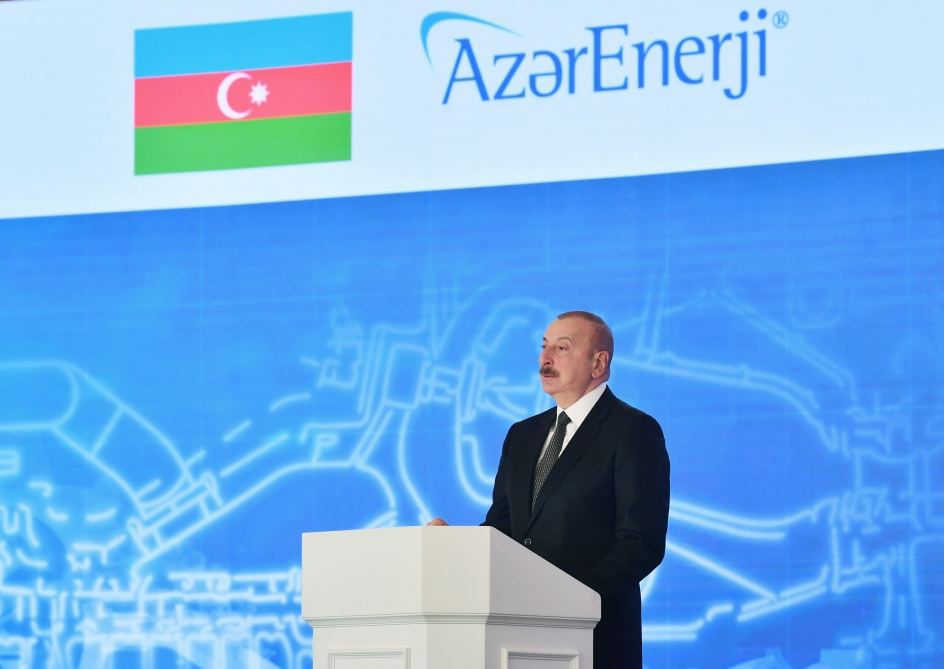BAKU, Azerbaijan, February 14. The groundbreaking ceremony held at the Gulustan Palace in Baku for a 1,280-MW thermal power plant was, without a doubt, a major event in the modern history of Azerbaijan. President Ilham Aliyev accomplished an important feat and a milestone by paving a way for a possible option for Azerbaijan to further diversify energy production.
The project, set in motion by the head of state earlier today, is another element of his new energy paradigm, which will elevate Azerbaijan from the oil and gas exporting country to the status of energy exporter.
Judging by capacity, the potential of this thermal power plant far surpasses the actual output of the Mingachevir Hydro Power Station (fully commissioned in 1954).
New energy paradigm
Speaking during the official ceremony, President Ilham Aliyev highlighted that the introduction of the power plant will enable the country to save approximately 800 million cubic meters or 1 billion cubic meters of gas per year, and to further contribute to the energy security of Europe.
The project will allow Azerbaijan to generate additional revenue by exporting extra volumes of gas to European partners, and strengthen its image as a reliable gas exporter, which is particularly important in the times of uncertainties related to energy supply from few reliable sources.
The head of state also noted that Azerbaijan would be able to export domestically produced electricity. This will be done also thanks to the green energy projects currently being implemented in several regions, of Azerbaijan, including Karabakh.
Carrying out several large scale energy projects in various regions of Azerbaijan give us valid grounds to assume that the key priority for Azerbaijan is to shift the export dominance from oil and gas to energy.
Many countries have already begun their transition to sustainable energy. And speaking of Azerbaijan, this is where President Ilham Aliyev's policy comes in.
"Currently, two stations are under construction - 470 megawatt solar and wind stations. The construction of the third station will start soon, and it will give us about 240 megawatts of additional power. Currently, on the basis of the documents signed with foreign investors, up to 25 gigawatts of solar and wind power plants are to be built, most of them in the Caspian Sea, and a few onshore. So, this is really a huge potential, and the wind energy potential of the Caspian Sea alone is equal to 157 gigawatts", the head of state said.
This is done to ensure long-term security, as the threats posed by relying on the exports of only one type of commodity cannot be exaggerated. Also, basing the long-term strategy on oil and gas exports is not an entirely effective approach, as the demand for oil and gas will gradually decrease in favor of sustainable energy.
In addition, from the climate protection perspective, gradually shifting away from hydrocarbon production to sustainable energy contributes to economic security in a a different way. Hydrocarbon extraction and transportation associated with it, damage the environment and may severely limit the economic and political capabilities of any country. If we look at the current energy policy of Azerbaijan, we can say that environmental protection directly contributes to future political and economic security.
This is particularly important in the context of the return of Azerbaijan's internally displaced persons to their native lands. Upon their return, the electricity demand in the restored regions will skyrocket. By changing the approach to energy security, Azerbaijan does a lot for the future protection of the environment of Karabakh and the country in general.
The country has the potential to become a regional leader in green energy due to having the first-mover advantage. This approach can, potentially, enable the country to generate highly specific know-how, which could be later shared with foreign partners.
Economic impact
The first and the most obvious is the construction of vital infrastructure, which will be used for decades and provide a significant number of employment opportunities. Launching a new long-term infrastructure project will create additional demands for highly trained personnel, which will improve the living standard of the local population. Supplying businesses with additional energy will enable them to tap into the previously unexplored potential, further strengthening the economy of Azerbaijan and especially, the regions of the country. This should not be seen strictly as an economic matter, rather, it should be seen as a prioritized long-term goal.
It is equally important that businesses in Azerbaijan will have a more expanded access to energy, and the ministry would have a fallback plan, in case of unforeseen events.
The implementation of such projects means that Baku is working toward strengthening its own energy security, in addition to providing an added layer of exports to other states. And once the energy security level undergoes an upgrade, the country will be able to offer more to foreign partners.
Energy policy modernization - part of systemic approach
In the past two years, Azerbaijan did a lot of work to address the global and regional challenges. The COVID-19 outbreak and the second Karabakh war are both behind now. Global geopolitical tension and high inflation, unfortunately, remain.
However, as the old saying goes, there is an opportunity in every crisis.
Purely from an economic perspective, President Ilham Aliyev is picking an extremely wise option to launch construction of the infrastructure projects today. High inflation will eat up the purchasing power of financial resources eventually. Waiting for a better time would have made the project more costly in the future due to inflation. To put it in simple terms, Azerbaijan will have the same infrastructure projects completed for a lesser amount of resources.
As a result of geopolitical tensions, Azerbaijan is becoming a central element in the new global transport architecture. It was not pure luck, however, but a consequence of strong belief and hard work carried out for many years.
In a recent interview with the local TV channels, President Ilham Aliyev noted that the development of the Trans-Caspian International Transport Route (TITR), also known as the Middle Corridor, did not happen overnight.
While, initially, there were various questions and critiques both among politicians and the expert community regarding the feasibility and the potential of the transport project, Azerbaijan and President Ilham Aliyev persisted in pursuing the development of the Middle Corridor. For many years it was hard to see how the end product will look like, however, eventually, it became clear that the Middle Corridor will function and has enormous potential. Today the consensus on the future of the project is reached and there is no doubt about the benefits that TITR will bring to all the participating countries.
It is a similar approach that we are witnessing now with regard to the energy policy. Perhaps, it is unclear for some people to envision the outcome, and whether the possibilities offered will be worth the investments. Just like it was the case with the development of Middle Corridor in the past. The new energy policy will bear fruit, but it will take some time before we can see the energy policy fully materialize.
President Ilham Aliyev launched the project that offers Azerbaijan several important benefits. Eventually, Azerbaijan will be rebranded and gain the reputation of an energy exporter, as opposed to the current status of oil and gas exporter. These changes will shape the future of Azerbaijan.







